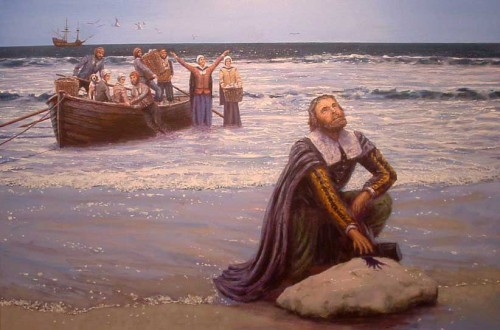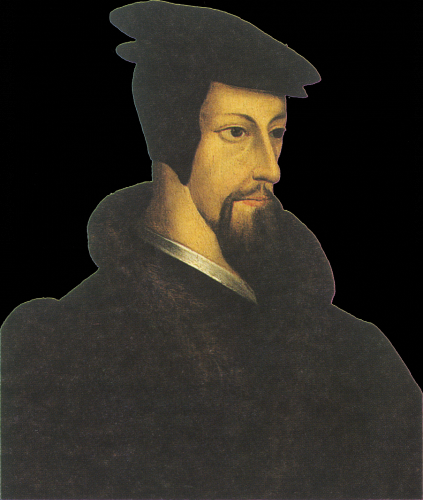samedi, 10 septembre 2011
Protestantism, Capitalism, & Americanism

Protestantism, Capitalism, & Americanism
By Edouard RIX
Translated by M. P.
Ex: http://www.counter-currents.com/
Many authors distinguish between, on the one hand Catholicism, which is supposed to be a negative Christianity incarnated by Rome and an anti-Germanic instrument, and, on the other hand, Protestantism, which is supposed to be a positive Christianity emancipated from the Roman papacy and accepting traditional Germanic values. In this perspective, Martin Luther is a liberator of the German soul from the despotic and Mediterranean yoke of papal Rome, his grand success being the Germanization of Christianity. The Protestants thus include themselves in the line of the Cathars and the Vaudois as representatives of the Germanic spirit in rupture with Rome.
But in reality, Luther is the one who first fomented the individualist and anti-hierarchical revolt in Europe, which would find expression on the religious plane by the rejection of the “traditional” content of Catholicism, on the political plane by the emancipation of the German princes from the emperor, and on the plane of the sacred by the negation of the principle of authority and hierarchy, giving a religious justification to the development of the merchant mentality.
On the religious plane, the theologians of the Reformation worked for a return to sources, to the Christianity of the Scriptures, without addition and without corruption, that is to say, to the texts of the Oriental tradition. If Luther rebelled against “the papacy instituted by the Devil in Rome,” it is only because he rejected the positive aspect of Rome, the traditional, hierarchical, and ritual component subsisting in Catholicism, the Church marked by Roman law and order, by Greek thought and philosophy, in particular that of Aristotle. Moreover, his words denouncing Rome as “Regnum Babylonis,” as an obstinately pagan city, recall those employed by the Hebraic Book of Revelation and the first Christians against the imperial city.
The balance sheet is as completely negative on the political plane. Luther, who presented himself as “a prophet of the German people,” favored the revolt of the Germanic princes against the universal principle of the Empire, and consequently their emancipation from any supranational hierarchical link. In effect, by his doctrine that admitted the right of resistance to a tyrannical emperor, he would legitimize rebellion against imperial authority in the name of the Gospel. Instead of taking up again the heritage of Frederick II, who had affirmed the superior idea of the Sacrum Imperium, the German princes, in supporting the Reformation, passed into the anti-imperial camp, desiring nothing more than to be “free” sovereigns.

Similarly, the Reformation is characterized on the plane of the sacred by the negation of the principle of authority and hierarchy, the Protestant theologians accepting no spiritual power superior to that of the Scriptures. Effectively, no Church or any Pontifex having received from the Christ the privilege of infallibility in matters of sacred doctrine, every Christian is able to judge for himself, by individual free examination, apart from any spiritual authority and any dogmatic tradition, the Word of God.
Besides individualism, this Protestant theory of free examination is connected with another aspect of modernity, rationalism, the individual who has rejected any control and any tradition basing himself on what, for him, is the basis of all judgment, reason, which then becomes the measure of all truth. This rationalism, much more virulent than that which existed in ancient Greece and in the Middle Ages, would give birth to the philosophy of the Enlightenment.
Beginning from the sixteenth century, Protestant doctrine would furnish an ethical and religious justification to the rise of the bourgeoisie in Europe, as the sociologist Max Weber demonstrates in The Protestant Ethic and the Spirit of Capitalism, a study on the origins of capitalism. According to him, during the initial stages of capitalist development, the tendency to maximize profit is the result of a tendency, historically unique, to accumulation far beyond personal consumption.
Weber finds the origin of this behavior in the “asceticism” of the Protestants marked by two imperatives, methodical work as the principal task in life and the limited enjoyment of its fruits. The unintentional consequence of this ethic, which had been imposed upon believers by social and psychological pressures to prove one’s salvation, was the accumulation of wealth for investment. He also shows that capitalism is nothing but an expression of modern Western rationalism, a phenomenon closely linked to the Reformation. Similarly, the economist Werner Sombart would denounce the Anglo-Saxon Handlermentalitat (merchant mentality), conferring a significant role to Catholicism as a barrier against the advance of the merchant spirit in Western Europe.
Liberated from any metaphysical principle, dogmas, symbols, rites, and sacraments, Protestantism would end by detaching itself from all transcendence and leading to a secularization of any superior aspiration, to moralism, and to Puritanism. It is thus that in Anglo-Saxon Puritan countries, particularly in America, the religious idea came to sanctify any temporal realization, material success, and wealth, prosperity itself being considered as a sign of divine election.
In his work, Les États-Unis aujourd’hui, published in 1928, André Siegfried, after having emphasized that “the only true American religion is Calvinism,” had already written: “It becomes difficult to distinguish between religious aspiration and pursuit of wealth . . . One thus admits as moral and desirable that the religious spirit becomes a factor of social progress and of economic development.” North America features, according to the formula of Robert Steuckers, “the alliance of the Engineer and the Preacher,” that is to say, the alliance of Prometheus and of Jean Calvin, or of the technics taken from Europe and of Puritan messianism issued from Judeo-Christian monotheism.
Transposing the universalistic project of Christianity into profane and materialistic terms, America aims to suppress frontiers, cultures, and differences in order to transform the living peoples of the Earth into identical societies, governed by the new Holy Trinity of free enterprise, global free trade, and liberal democracy. Undeniably, Martin Luther and, even more so, Jean Calvin, are the spiritual fathers of Uncle Sam . . .
As for us, we young Europeans viscerally reject this individualist, rationalist, and materialist West, the heir of the Reformation, the pseudo-Renaissance, and the French Revolution, as so many manifestations of European decadence. We will always prefer Faust to Prometheus, the Warrior to the Preacher, Nietzsche and Evola to Luther and Calvin.
Source: http://www.voxnr.com/cc/di_antiamerique/EpVAkuZFllAtfQNhcl.shtml [3]
Article printed from Counter-Currents Publishing: http://www.counter-currents.com
URL to article: http://www.counter-currents.com/2011/09/protestantism-capitalism-and-americanism/
00:05 Publié dans Philosophie | Lien permanent | Commentaires (0) | Tags : protestantisme, puritanisme, américanisme, théorie politique, politologie, sciences politiques, philosophie |  |
|  del.icio.us |
del.icio.us |  |
|  Digg |
Digg | ![]() Facebook
Facebook



Les commentaires sont fermés.